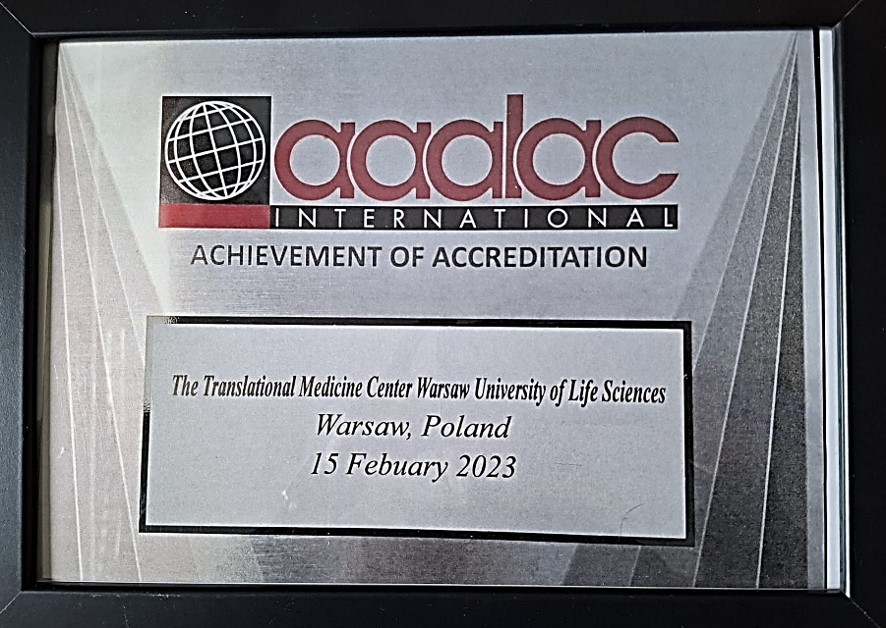
Large Animal Models Laboratory Center for Translational Medicine
The Large Animal Models
Laboratory at the Center for
Translational Medicine is an
integral part
of a modern
research unit dedicated to
housing and conducting
advanced research on large
animal models.
It fully complies
with the highest global standards
of scientific quality and ethics,
addressing the growing need for
translational and preclinical
studies
on large biological
models.
The laboratory has held the
status of a scientific and
educational facility since July
2021,
in accordance with the Act
of January 15, 2015, on the
Protection of Animals Used for Scientific or Educational Purposes.
All experimental procedures are
approved by the 2nd Local Ethical Committee for Animal Experiments
at Warsaw University of Life
Sciences (SGGW).

In February 2023, the laboratory received full accreditation from AAALAC International (Association for
Assessment and Accreditation of Laboratory Animal Care International), confirming compliance with the
strictest international standards for animal welfare, ethical research practices, and scientific data quality.
Infrastructure and Animal Housing Conditions
The Large Animal Models Laboratory offers modern facilities designed for both individual and group housing of livestock and laboratory animals at all life stages, including pigs, cattle, goats, sheep, and rabbits. The site also supports research procedures in fully equipped surgical suites and utilizes advanced telemetry systems.
Each room has been designed taking into account the specificity of a given species and animal welfare requirements.
Access to appropriately selected equipment is provided, including feeders, automatic watering systems, bedding, environmental enrichment elements and advanced ventilation and air conditioning systems.
Environmental parameters — temperature and humidity — are continuously monitored and regulated through automated control systems, ensuring reproducibility of experimental conditions and optimal animal welfare.
The laboratory operates under the highest biosecurity standards, in full compliance with the current regulations on African Swine Fever (ASF) prevention (Regulation of the Minister of Agriculture and Rural Development of April 24, 2024). Biosecurity protocols include controlled access, disinfection procedures, barrier systems, and strict control of animal movement and waste disposal.
In order to ensure safety and continuity of operation, the Laboratory is additionally equipped with alarm systems that immediately inform about any deviations from the established environmental parameters.
In case of emergencies, the facility is equipped with alarm systems, backup power generators, and its own water supply to maintain uninterrupted operation and environmental stability.
Additionally, the laboratory has a registered animal transport vehicle that meets the requirements of Council
Regulation (EC) No 1/2005 on animal welfare during transport.
Transportation is carried out under
veterinary supervision and with licensed animal handlers.
Animals are sourced from trusted suppliers to
ensure high health and breeding standards.
Specialized Infrastructure
- Housing units for pigs, sheep, goats, cattle,
- Dedicated high-biosecurity room with sanitation barriers,
- Metabolic cagesfor individual monitoring of pigs
- Calf rearing pens,
- Artificial sow system for neonatology research (preterm and newborn piglets)
- Necropsy room,
- Storage areas for bedding, materials, and tools
- 24/7 animal monitoring via video surveillance
- własny certyfikowany środek transportu and licensed handlers
All infrastructure is designed to ensure optimal welfare, experimental conditions, and the highest scientific data quality.
Personnel and Animal Care
A team of highly qualified professionals provides veterinary care and technical support, including:
- Licensed veterinarians with specialties in surgery, diagnostic imaging, reproduction, and swine health
- Experienced researchers and certified animal technicians incompliance with the Act of January 15, 2015 (consolidated version 2023)
- Technical staff maintaining monitoring, ventilation, and alarm systems.
Animals are under constant veterinary care and observation. Welfare monitoring includes detection of stress, discomfort, or suffering, with corrective actions taken as necessary. Group housing and enrichment are prioritized unless experimental protocols specify otherwise.
The Animal Welfare Body oversees all procedures in accordance with Article 25 of the Act on the Protection of Animals Used for Scientific or Educational Purposes.
Research Capabilities and Collaboration
The laboratory supports a wide range of scientific and preclinical projects, including:
- Disease modeling (type 2 diabetes, cardiovascular, neurological, orthopedic, and oncological diseases)
- Physiological, nutritional, pharmacological, and toxicological studies
- Testing of therapeutic technologies and biomedical devices
- Preclinical studies for pharmaceutical and biomedical industries
- Educational and academic research projects
The laboratory also offers:
- Assistance in developing animal study protocols following 3R principles
- Consulting in ethics application preparation
- możliwość integracji projektów badawczych z zapleczem Pracowni Diagnostyki Obrazowej (MRI 3T, CT) i Laboratoriami Histologii, Mikroskopii, Mikrobiologii i Biologii Molekularnej.
For inquiries and collaboration offers, please contact:
- Animal Studies Coordinator
- Dr. Maria Sady — maria_sady@sggw.edu.pl maria_sady@sggw.edu.pl
- Large Animal Facility Manager
Dr. Karolina Ferenc karolina_ferenc@sggw.edu.pl
- CMT Secretariat
cmt@sggw.edu.pltel: +48 22 593 38 40
